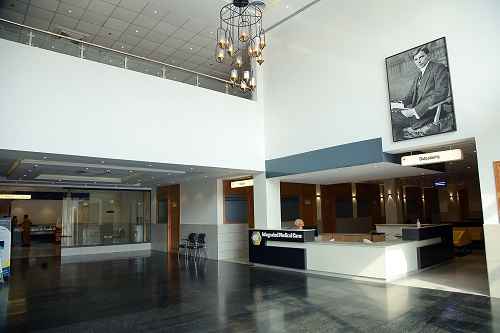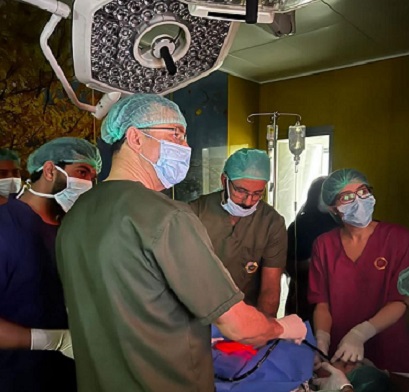- 15-Mar-23
Endoscopy is a medical procedure that involves the use of an endoscope, which is a long, thin, flexible tube with a light and a camera at the end. Through a tiny incision or a natural opening like the mouth or anus, the endoscope is inserted into the body.
Endoscopy allows doctors to examine the inside of the body without the need for surgery. It can be used to diagnose and treat a variety of medical conditions, such as digestive system disorders, respiratory system disorders, and urinary tract disorders.
Endoscopy Meaning in Urdu:
اینڈوسکوپیکا مطلب ہے "اندرونی جسم کی تشخیص کے لیے نازک تھریڈ جیسی نالی کے ذریعے آنا"۔
Types of Endoscopy:
There are various types of endoscopy procedures that can be performed depending on the area of the body being examined. The following are some of the most typical forms of endoscopy:
-
Upper endoscopy: This procedure examines the upper gastrointestinal (GI) tract which includes the esophagus, stomach, and duodenum (the first part of the small intestine).
-
Colonoscopy: This procedure examines the large intestine (colon) and rectum.
-
Bronchoscopy: This procedure examines the airways and lungs.
-
Cystoscopy: This procedure examines the bladder and urethra.
-
Enteroscopy: This procedure examines the small intestine.
-
Hysteroscopy: This procedure examines the uterus and cervix.
-
Arthroscopy: This procedure examines the inside of a joint such as the knee or shoulder.
-
Laparoscopy: This procedure examines the abdominal cavity and is often used in surgical procedures.
-
Gastroscopy: This procedure is similar to upper endoscopy but focuses on examining the stomach.
-
Endoscopic ultrasound (EUS): This procedure uses an endoscope with an ultrasound probe to obtain images of organs and tissues inside the body.
Endoscopy Procedure:
The endoscopy procedure can vary depending on the type of endoscopy being performed but generally the steps involved in an endoscopy procedure are as follows:
-
Preparation: Before the procedure the patient may be asked to fast for a certain period of time and may be given medication to help clear the bowels or to relax the muscles.
-
Anesthesia: Depending on the type of endoscopy being performed the patient may be given a local anesthesia to numb the area being examined or a sedative to help them relax.
-
Insertion of the endoscope: The endoscope is inserted through a natural opening such as the mouth, anus or urethra or through a small incision. The endoscope is guided through the body to the area being examined.
-
Visualization: The endoscope contains a camera that transmits images to a monitor, allowing the doctor to see inside the body.
-
Biopsy: If necessary, the doctor may take a tissue sample (biopsy) for further analysis.
-
Removal of the endoscope: Once the procedure is complete the endoscope is slowly removed from the body.
-
Recovery: After the procedure the patient may be monitored for a short period of time before being allowed to go home. Depending on the type of anesthesia used the patient may need someone to drive them home.
It's important to follow any instructions provided by the doctor or healthcare team before and after the procedure to ensure a successful and safe endoscopy.
When to see a Doctor:
You should see a doctor for an endoscopy if you are experiencing symptoms such as digestive issues, unexplained weight loss, gastrointestinal bleeding, respiratory issues, or urinary issues.
Best Endoscopy in Lahore:
Integrated Medical Care Hospital (IMC Hospital) is one of the most prestigious institutions in Pakistan which is known for its performance and outstanding results regarding Endoscopy also known as esophagogastroduodenoscopy (EGD). Here you find one of the Best Endoscopy specialists in Lahore Pakistan.
Endoscopy Test Price:
IMC Hospital is the Best Hospital in Pakistan and has good services at the best price. Visit Integrated Medical Care Hospital and book your appointment at (IMC Hospital).
Prof. Dr. Ghias Un Nabi Tayyab
MBBS, MRCP (UK), FRCP (Edin), MD (USA), AGAF (USA).
Specialties: Gastroenterology, Hepatology (Liver Diseases).
Areas of Focus: Gastroenterology, Hepatology (Liver Diseases), Advanced Endoscopy.
Dr. Ayesha Hanif Ramay
MBBS, FCPS (Gastroenterology & Hepatology).
Specialties: Gastroenterology.
Areas of Focus: Gastroenterology, Hepatology, Diagnostic and Therapeutic Endoscopy.
Dr. Muhammad Bilal Nasir
MBBS, FCPS(Medicine), FCPS (Gastroenterology), MACG.
Specialties: Gastroenterology.
Areas Of Focus: 1. Neurogastromotility Like Achalasia cardia, Constipation, GERD, Functional Dyspepsia. 2. Luminal Endoscopy like Esophageal band ligation, Esophageal Stenting, Duodenal Stenting. Esophageal and Pyloric Balloon Dilatation, Direct Endoscopic Necrosectomy.

 Map
Map










